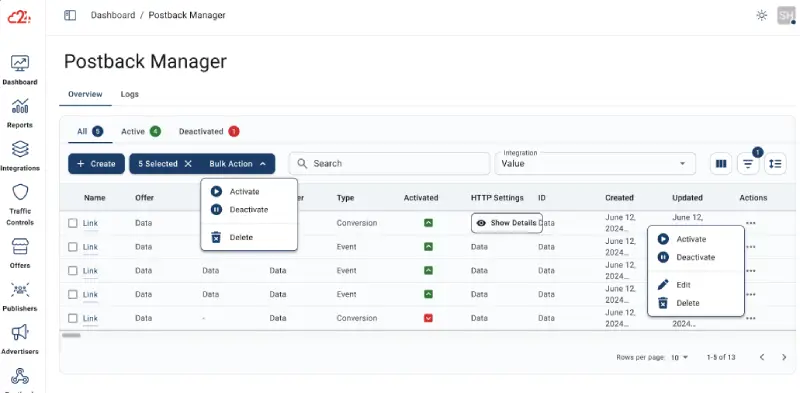Unlocking Lead Monetization: Boost Affiliate Marketing Revenue with Ping Post
Lorem ipsum dolor sit amet, consectetur adipiscing elit. Ut elit tellus, luctus nec ullamcorper mattis, pulvinar dapibus leo.
Challenges of Using Ping Posts in Affiliate Marketing
While ping posts offer efficiency and value maximization in lead distribution, they are not without their challenges. Successfully implementing a ping post system requires addressing various technical, operational, and ethical hurdles.
1. Technical Complexity
Ping post systems rely on real-time data exchanges, making them highly dependent on robust infrastructure. Challenges include:
- Latency Issues: Delays in data transfer can result in missed opportunities or lost leads.
- Integration Difficulties: Ensuring compatibility between systems (CRMs, lead platforms, and buyers’ systems) often demands custom APIs and continuous updates.
- Scalability: As the volume of leads grows, maintaining speed and reliability becomes harder without significant investment in infrastructure.
2. Data Privacy and Compliance
Handling consumer data within a ping post system must align with regulations like GDPR, CCPA, and other privacy laws. Key concerns include:
- Partial Data Risks: Even limited data shared during the “ping” phase can potentially expose sensitive information.
- Consent Management: Ensuring that lead data is processed and shared only with proper consent is both a technical and legal challenge.
3. Buyer Competition and Pricing Conflicts
While ping posts aim to maximize profits, they can also lead to disputes among buyers:
- Bid Transparency: Buyers may demand insight into how leads are scored and distributed, creating tension over fairness.
- Price Wars: Aggressive competition can push bid prices down, hurting profitability for networks and publishers.
Challenges of Using Ping Posts in Affiliate Marketing
While ping posts offer efficiency and value maximization in lead distribution, they are not without their challenges. Successfully implementing a ping post system requires addressing various technical, operational, and ethical hurdles

1. Technical Complexity
Ping post systems rely on real-time data exchanges, making them highly dependent on robust infrastructure. Challenges include:
- Latency Issues: Delays in data transfer can result in missed opportunities or lost leads.
- Integration Difficulties: Ensuring compatibility between systems (CRMs, lead platforms, and buyers’ systems) often demands custom APIs and continuous updates.
- Scalability: As the volume of leads grows, maintaining speed and reliability becomes harder without significant investment in infrastructure.
2. Data Privacy and Compliance
Handling consumer data within a ping post system must align with regulations like GDPR, CCPA, and other privacy laws. Key concerns include:
- Partial Data Risks: Even limited data shared during the “ping” phase can potentially expose sensitive information.
- Consent Management: Ensuring that lead data is processed and shared only with proper consent is both a technical and legal challenge.
3. Buyer Competition and Pricing Conflicts
While ping posts aim to maximize profits, they can also lead to disputes among buyers:
- Bid Transparency: Buyers may demand insight into how leads are scored and distributed, creating tension over fairness.
- Price Wars: Aggressive competition can push bid prices down, hurting profitability for networks and publishers.
Solutions
While ping posts offer efficiency and value maximization in lead distribution, they are not without their challenges. Successfully implementing a ping post system requires addressing various technical, operational, and ethical hurdles
1. Technical Complexity
Ping post systems rely on real-time data exchanges, making them highly dependent on robust infrastructure. Challenges include:
- Latency Issues: Delays in data transfer can result in missed opportunities or lost leads.
- Integration Difficulties: Ensuring compatibility between systems (CRMs, lead platforms, and buyers’ systems) often demands custom APIs and continuous updates.
- Scalability: As the volume of leads grows, maintaining speed and reliability becomes harder without significant investment in infrastructure.
2. Buyer competition and pricin conflicts
While ping posts aim to maximize profits, they can also lead to disputes among buyers:
- Bid Transparency: Buyers may demand insight into how leads are scored and distributed, creating tension over fairness.
- Price Wars: Aggressive competition can push bid prices down, hurting profitability for networks and publishers.




